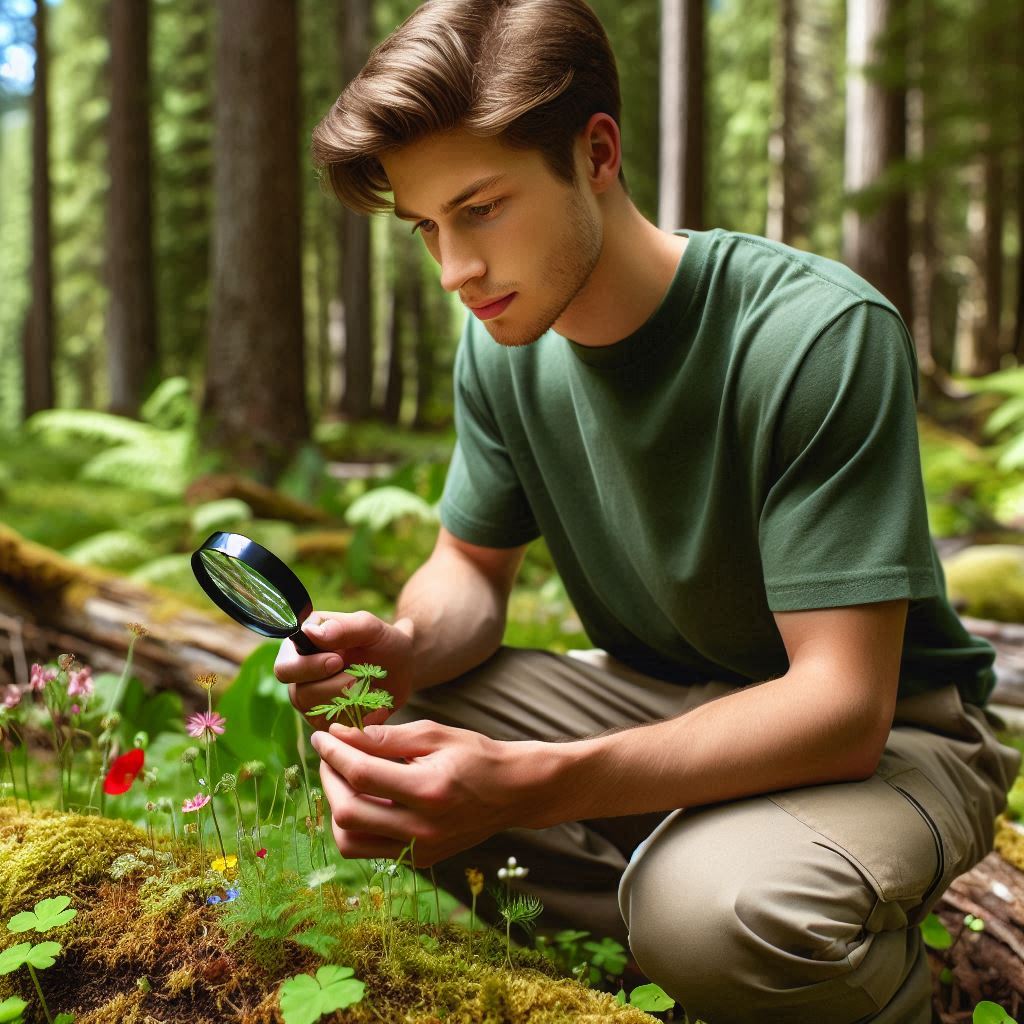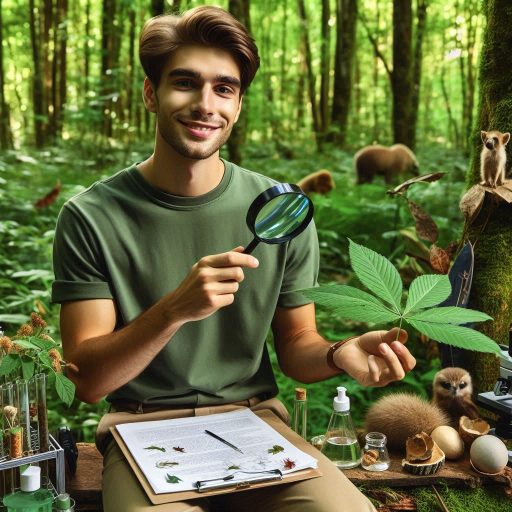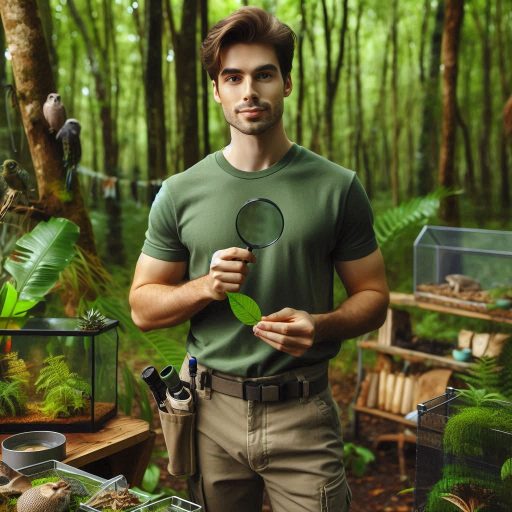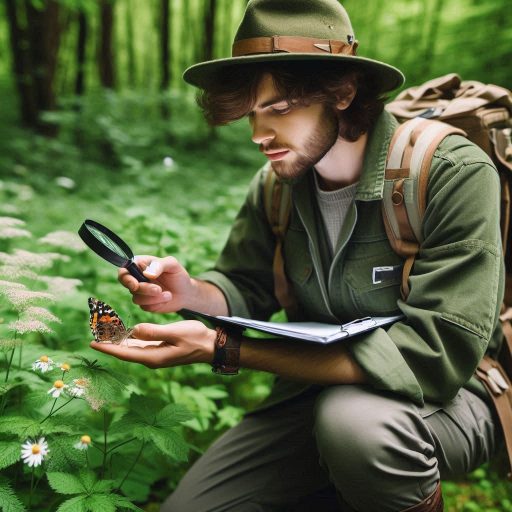Introduction
Internships are vital for ecology students, offering hands-on experience beyond classroom learning.
Practical skills gained in real-world settings build a solid foundation for future careers.
Engaging in internships allows students to explore diverse ecosystems, conservation methods, and research techniques.
This exposure helps clarify career paths and areas of interest within ecology.
Internships also provide an opportunity to apply theoretical knowledge in a professional environment.
Working alongside seasoned professionals, students learn problem-solving, data collection, and fieldwork skills.
These experiences enhance their academic understanding while fostering adaptability in dynamic ecosystems.
Additionally, internships enable students to build a network of professionals.
Connections made during this period can lead to future job opportunities and mentorship.
In a competitive job market, having relevant internship experience gives ecology students a distinct advantage.
Employers often seek candidates who have practical experience and a clear understanding of their field.
Internships serve as a stepping stone, helping students transition from academic settings to real-world careers.
The hands-on experience gained through internships is crucial for success in this field.
Understanding the Benefits of Internships for Ecology Students
Exposure to Real-World Ecological Challenges
Internships offer ecology students firsthand experience with real-world environmental issues.
They immerse students in the daily tasks of professionals working to address critical ecological problems.
These internships expose students to ecosystems under stress, such as endangered species habitats or polluted watersheds.
Through direct involvement, students learn how to assess environmental damage and design effective interventions.
This exposure to real-world ecological challenges provides valuable insights into the complexities of nature and the human impact on the environment.
It also strengthens problem-solving skills, helping students navigate unpredictable challenges in their future careers.
Fieldwork during internships often presents unique obstacles that are difficult to replicate in a classroom.
Dealing with factors such as weather, difficult terrain, or equipment malfunctions gives students a better understanding of how real-world research unfolds.
These challenges teach resilience and adaptability, crucial traits for any aspiring ecologist.
By facing these obstacles head-on, students gain confidence in their ability to contribute to the field.
Opportunity to Apply Theoretical Knowledge in Practical Settings
An internship allows ecology students to bridge the gap between theory and practice.
Students often study ecological principles in-depth during their coursework but may struggle to see how these theories apply to actual ecosystems.
Internships give them the chance to put their knowledge to work.
For example, students might conduct species surveys, gather water quality data, or assist in habitat restoration projects.
Each of these activities requires a deep understanding of ecological concepts learned in the classroom.
In turn, students get to observe the effects of these practices on the environment.
Internships also provide access to specialized tools and technologies, which many students may not have used before.
They may work with GPS mapping systems, drone technology, or advanced data analysis software.
Using these tools, students can refine their technical skills and apply them to real-world conservation efforts.
This experience helps them develop a well-rounded skill set, making them more marketable to future employers.
Additionally, interns often get feedback from experienced professionals, further honing their practical abilities.
Building Professional Connections and Networking in the Field
Networking is one of the most significant benefits of internships for ecology students.
Internships place students in direct contact with professionals working in the field, providing a valuable opportunity to build relationships.
These connections can lead to job offers, future collaborations, or mentorship opportunities.
Many internships also involve team-based projects, allowing students to work alongside experts and gain insights into various career paths in ecology.
Being part of an established network also opens doors to exclusive opportunities, including advanced research positions, conferences, and workshops.
Networking helps students stay updated on the latest trends and challenges in ecology.
Developing strong professional connections early in a career gives students a competitive advantage when applying for jobs or research grants.
It also provides a support system of like-minded individuals who share a passion for environmental preservation.
In short, internships offer critical opportunities for ecology students to build meaningful relationships, advancing both their academic and professional pursuits.
Types of Internship Opportunities Available
Internships in ecology offer students hands-on experience and valuable skills.
These opportunities span various sectors, each offering unique learning experiences.
Here are three major types of internships available to ecology students:
Research Internships with Environmental Organizations
Research internships are ideal for students passionate about scientific investigation.
These opportunities allow students to work closely with environmental organizations, contributing to important research projects.
You may collect data, analyze environmental patterns, or assist in compiling reports for publication.
The skills gained from these internships are valuable for students interested in environmental policy or further academic research.
Many organizations, such as the World Wildlife Fund (WWF) and Environmental Defense Fund (EDF), offer research-based internships.
These opportunities can expose students to real-world challenges, requiring them to apply their theoretical knowledge to actual environmental issues.
Research internships often lead to future job opportunities or graduate programs.
Fieldwork Internships with Ecological Research Centers
Fieldwork internships are another exciting option for students who love hands-on learning in natural environments.
These internships offer the chance to engage directly with ecosystems, studying species, collecting samples, and conducting observations.
Internships with ecological research centers often involve travel to remote areas, allowing students to immerse themselves in the field.
Working with experienced researchers, students can gain practical skills like biodiversity surveying, sample collection, and habitat monitoring.
These internships typically focus on studying various ecosystems, from forests to wetlands, providing a well-rounded ecological education.
Fieldwork internships prepare students for roles in environmental consulting or applied ecological research.
Conservation Internships with Wildlife and Nature Reserves
Conservation internships offer students a chance to make a tangible impact on preserving the environment.
These internships are typically offered by wildlife sanctuaries, nature reserves, and conservation organizations.
Students may work on projects aimed at protecting endangered species, restoring habitats, or promoting biodiversity.
Conservation internships often include a mix of fieldwork and education, teaching students the principles of wildlife management and ecosystem conservation.
Participants can expect tasks such as habitat restoration, wildlife monitoring, and public outreach efforts to raise awareness.
Organizations like the National Park Service and The Nature Conservancy frequently offer internships with a strong conservation focus.
These opportunities are perfect for students interested in direct action to protect natural resources.
Internships in research, fieldwork, and conservation provide varied and enriching experiences for ecology students.
Each offers distinct benefits and career prospects, allowing students to explore different areas within the ecological field.
By engaging in these opportunities, students not only gain practical skills but also make valuable connections within the environmental sector.
Explore internship opportunities that match your passion for scientific research, hands-on fieldwork, or conservation efforts.
Find the right internship that aligns with your goals and interests.
These experiences often serve as stepping stones toward a fulfilling and impactful career in ecology.
Read: Continuous Learning: Post-graduate Options for US Biologists
How to Search for Internship Opportunities
Finding the right ecology internship requires a strategic approach.
By using various methods, you can increase your chances of landing valuable opportunities.
You can effectively search for internships by using online job boards and platforms.
Networking with ecology professionals will help you discover new opportunities.
Additionally, seeking assistance from academic advisors can provide valuable guidance.
Utilizing Online Job Boards and Internship Platforms
Online job boards and internship platforms are excellent resources for ecology students.
Websites such as Indeed, Glassdoor, and LinkedIn offer numerous listings, making them ideal starting points.
Many of these platforms also allow you to set up job alerts based on specific keywords, like “ecology internship” or “environmental science.
This way, you receive notifications when new opportunities arise.
Specialized platforms, such as Conservation Job Board, EnvironmentalCareer.com, and Handshake, focus specifically on environmental and ecological careers.
These platforms often feature internships that might not be available on larger job boards.
Handshake, in particular, partners with many universities, giving students access to exclusive listings.
Spend time familiarizing yourself with these platforms to maximize your search.
Always keep your profiles up to date and tailored to the specific internships you’re seeking.
An updated profile allows recruiters to find you, increasing your visibility and chances of being contacted.
Networking with Ecology Professionals at Conferences and Events
Attending conferences and events is one of the best ways to network in the ecology field.
Networking can open doors to internships that may not be advertised online.
Start by attending local and regional conferences related to ecology and environmental science.
If possible, also consider attending national or international events.
Ecology conferences, such as the Ecological Society of America (ESA) Annual Meeting, offer valuable opportunities to meet professionals and researchers.
Be proactive at these events by introducing yourself and expressing your interest in internships.
Many attendees are eager to share opportunities within their organizations or connect you to others who may know of openings.
Workshops, webinars, and symposiums are also great places to expand your network.
Always have your resume and business cards ready for in-person events.
For virtual events, ensure your LinkedIn profile is polished and professional, as many connections will follow up through that platform.
Reaching Out to Academic Advisors for Recommendations and Assistance
Your academic advisor is one of your most valuable resources when searching for internships.
Many advisors have strong industry connections and often know about internships that haven‘t been widely advertised.
Schedule regular meetings with your advisor to discuss your career goals and ask for recommendations.
Professors and faculty members are also valuable resources for internships.
They may have ongoing projects that need student involvement or may know of colleagues seeking interns.
Cultivating relationships with your professors can provide you with exclusive opportunities and strong references for future applications.
In addition, some schools have career services dedicated to helping students find internships.
These offices often partner with organizations to offer exclusive opportunities to students.
By leveraging these three strategies, you will significantly improve your chances of securing an ecology internship that aligns with your career goals.
Read: US Chemistry Conferences and Symposiums to Attend in 2024
Tips for Crafting a Strong Internship Application
Crafting a standout application is essential when pursuing an ecology internship.
By following these strategies, you can position yourself as a top candidate and demonstrate your commitment to the field.
Tailor Your Resume and Cover Letter
Customize your resume and cover letter to emphasize your most relevant experiences and skills.
Employers want to see that you’ve thoughtfully aligned your qualifications with their needs.
Highlight ecology-related coursework, lab work, and field experiences that relate directly to the internship.
Be specific about your hands-on experiences, such as working on field studies, collecting data, or volunteering with environmental organizations.
Mention how these roles equipped you with practical skills that can benefit the internship program.
If you completed a project, briefly explain your role, the results, and its relevance to the internship.
In your cover letter, explain why you‘re excited about the specific organization or program.
Address how your academic background and experiences align with their mission.
This not only shows enthusiasm but also proves you’ve done your research.
Transform Your Career Today
Unlock a personalized career strategy that drives real results. Get tailored advice and a roadmap designed just for you.
Start NowEmphasize Your Passion for Ecology and Commitment To Environmental Conservation
Employers value applicants who display genuine passion for ecology and environmental conservation.
Use your resume and cover letter to reflect your deep interest in ecological work.
Mention how you‘ve pursued this interest both inside and outside the classroom.
If you‘ve participated in any sustainability efforts, like campus conservation projects or environmental clubs, share these experiences.
They demonstrate your dedication to making a positive impact on the environment.
Be sure to note any leadership roles you’ve held or initiatives you’ve started.
Employers want to see that you’re proactive and driven by purpose.
In your cover letter, weave in your motivation for pursuing a career in ecology.
Explain why you‘re passionate about the environment and how this passion has guided your academic and extracurricular choices.
Personal stories or moments of inspiration can make your application stand out and give it a human touch.
Keep Your Application Materials Organized and Professional
Your application package should be neat, organized, and easy to navigate.
Start by thoroughly reviewing the internship requirements and preparing all necessary documents well in advance.
Make sure your resume is formatted consistently and is free of errors.
Use bullet points to clearly outline your skills and accomplishments.
For your cover letter, follow a professional structure, beginning with a polite greeting and introduction.
Ensure the tone is enthusiastic yet professional, and keep the letter concise, no longer than one page.
Double-check for spelling or grammar errors before submitting your materials.
Consider naming your files with your full name and the internship title, making it easier for recruiters to track your application.
Keep a copy of everything you send for reference during the interview process.
By taking these steps, you’ll create a professional, compelling application that highlights your qualifications and dedication to the field of ecology.
Read: Key Roles and Responsibilities of a Chemist in the US

Preparing for Internship Interviews
Securing an internship in ecology requires preparation and confidence.
A well-prepared candidate stands out in a competitive field.
Here are essential tips to help you shine during your internship interviews.
Researching the Organization and Its Work in Ecology
Start by thoroughly researching the organization.
Understand its mission, values, and ongoing projects.
Familiarize yourself with the specific area of ecology they focus on.
Whether it‘s conservation, marine biology, or environmental policy, knowing their work shows your genuine interest.
Explore the organization‘s website and read recent publications.
Look for reports, blogs, or case studies they have produced.
This information will help you discuss their work knowledgeably.
Additionally, follow them on social media platforms.
Engage with their content to gain insights into their culture and activities.
Consider connecting with current or former interns.
They can provide valuable information about the organization‘s work environment.
Ask them about their experiences and any tips they might have for the interview.
Networking can offer perspectives that aren‘t available online.
Prepare thoughtful questions to ask during the interview.
This demonstrates your interest and engagement.
Ask about specific projects, future goals, or the organization‘s challenges in the field of ecology.
Tailoring your questions to their work will make a positive impression.
Practicing Common Interview Questions Related to Ecology and Conservation
Next, practice common interview questions related to ecology.
Anticipating these questions can boost your confidence.
Review typical inquiries like, ‘What inspired you to pursue a career in ecology?‘ or ‘How do you approach conservation challenges?‘
Use the STAR method to structure your responses.
Describe the Situation, Task, Action, and Result.
This method helps you convey your experiences clearly and effectively.
Be prepared to discuss your academic background and any relevant projects or research.
Highlight how your skills align with the organization‘s needs.
Consider role-playing with a friend or mentor.
Conduct mock interviews to simulate the experience.
This practice can help you refine your responses and improve your delivery.
Focus on speaking clearly and concisely.
You should also stay updated on current ecological issues.
Be ready to discuss recent developments in conservation.
Knowledge of contemporary topics shows your commitment to the field.
This awareness will help you connect your experiences to real-world challenges.
Dressing Professionally and Showing Enthusiasm for the Opportunity
First impressions matter, so dress professionally for your interview.
Choose attire that reflects the organization‘s culture.
When in doubt, opt for business casual.
A neat appearance conveys your seriousness about the opportunity.
Additionally, practice good body language during the interview.
Maintain eye contact and offer a firm handshake.
Sit up straight and avoid fidgeting.
These small details contribute to a confident demeanor.
Most importantly, show enthusiasm for the internship opportunity.
Express your passion for ecology and conservation.
Share why you are excited about the organization‘s work.
Enthusiasm is contagious and can leave a lasting impression.
Conclude your interview by thanking the interviewer for their time.
Reinforce your interest in the position and the organization.
A positive closing can leave a strong impression and keep you in their minds.
Preparing for an internship interview requires thorough research, practice, and professionalism.
By focusing on these areas, you can confidently navigate the interview process and increase your chances of securing the internship.
Read: Earning Potential: Chemist Salaries Across US States
Making the Most of the Internship Experience
Internships offer a unique opportunity for ecology students to gain hands-on experience.
To maximize this experience, students should focus on three key areas:
Setting clear learning goals and objectives, seeking mentorship from experienced professionals, and actively participating in projects and initiatives.
Setting Clear Learning Goals and Objectives
Start your internship with clear learning goals.
These goals guide your daily activities and keep you focused.
Think about what skills you want to develop.
You might aim to improve your research techniques or learn data analysis software.
Write down your objectives before the internship begins.
This list will help you stay on track.
Share your goals with your supervisor as well.
They can provide guidance and help you refine your objectives.
Review your goals regularly throughout the internship.
Reflect on your progress and adjust your objectives as necessary.
If you find that your initial goals are not challenging enough, revise them.
Having specific learning objectives enhances your experience.
It allows you to evaluate your performance effectively.
By the end of your internship, you will have a clearer sense of your accomplishments.
Seeking Mentorship from Experienced Professionals
Mentorship plays a crucial role in your professional development.
Seek out experienced professionals in your field.
A mentor can provide valuable insights and guidance.
They can also help you navigate the complexities of the ecology field.
Start by identifying potential mentors.
Look for individuals who align with your interests and career goals.
Reach out to them early in your internship.
Express your interest in learning from their experiences.
Schedule regular check-ins with your mentor.
These meetings can provide opportunities for discussion and feedback.
Ask questions about their career paths and seek advice on your own journey.
In addition to formal mentorship, build relationships with other professionals.
Engage in conversations and ask for feedback on your work.
Networking with your colleagues can lead to future job opportunities.
Actively Participating in Projects and Initiatives
Don‘t sit back and wait for tasks to come to you.
Actively seek opportunities to participate in projects.
Volunteer for assignments and take the initiative.
This proactive approach will enhance your learning experience.
Get involved in diverse projects to broaden your skill set.
Participate in fieldwork, research initiatives, or community outreach programs.
Each experience will contribute to your knowledge and capabilities.
Ask your supervisor for additional responsibilities.
Taking on more tasks can showcase your dedication.
It also provides a chance to demonstrate your skills.
Collaborate with your colleagues on projects.
Teamwork can foster new ideas and creative solutions.
Share your knowledge and learn from others‘ expertise.
By actively engaging in your internship, you‘ll gain valuable skills.
You will also build a professional network that can support your career.
Maximizing your internship experience requires setting clear goals, seeking mentorship, and actively participating in projects.
By focusing on these areas, you can enhance your learning and pave the way for a successful career in ecology.
Embrace every opportunity that comes your way, and make the most of your internship journey.
Uncover the Details: How to Get Your First Job as a Biostatistician
Reflecting on the Internship Experience and Lessons Learned
Internships play a vital role in shaping the careers of ecology students.
They provide hands-on experience and valuable insights.
After completing an internship, it‘s essential to reflect on your time.
This reflection can highlight strengths, identify areas for growth, and shape your future career goals.
Identifying Strengths and Areas for Growth
During your internship, take time to assess your strengths.
What tasks did you excel at? Did you enjoy conducting fieldwork, analyzing data, or collaborating with others? Recognizing your strengths helps build confidence.
It also directs you towards future opportunities that align with these skills.
Next, consider areas for growth.
What challenges did you face? Did you struggle with certain tasks or concepts? Acknowledging these difficulties is crucial for personal development.
Seek feedback from supervisors or colleagues.
Constructive criticism provides a roadmap for improvement.
Use this insight to enhance your skills for future positions.
Documenting Accomplishments and Projects
Keeping a record of your accomplishments during the internship is essential.
Document projects you completed and skills you developed.
Did you contribute to a research study or lead a conservation initiative? Outline specific responsibilities and achievements.
This documentation showcases your experience on your resume or portfolio.
Highlight measurable outcomes.
For instance, did your project improve habitat conditions for a species?
Did you collect significant data that informed a research paper?
Transform Your Career Today
Unlock a personalized career strategy that drives real results. Get tailored advice and a roadmap designed just for you.
Start NowQuantifying your achievements provides concrete evidence of your contributions.
This information becomes invaluable when applying for future internships or jobs.
Considering Future Career Goals
Reflecting on your internship also allows you to refine your career aspirations.
Did the experience affirm your interest in a specific area of ecology? Perhaps you discovered a passion for conservation, research, or policy work.
Use this clarity to guide your next steps.
Consider how the skills you gained align with your career goals.
Are there particular roles or organizations that resonate with your newfound interests? Research potential job opportunities or advanced study programs in those areas.
Set specific, achievable goals to help you progress in your chosen field.
Regular reflection enhances your professional growth.
Set aside time to revisit your experiences.
This practice fosters a deeper understanding of your journey.
Documenting insights and lessons learned helps solidify your experiences.
Engaging with mentors or peers can deepen this reflection process.
Share your experiences and listen to theirs.
They may offer new perspectives or advice that enriches your understanding.
These conversations can spark new ideas or directions for your career.
Reflecting on your internship experience is crucial for growth.
Identifying strengths, documenting accomplishments, and considering future goals shape your career path.
Use this reflection as a guide to navigate your journey in the ecology field.
With each internship, you build a clearer vision of your professional aspirations.
Embrace this process, and let it guide you toward a fulfilling career in ecology.
Conclusion
Internships play a vital role in shaping the careers of ecology students.
They provide hands-on experience in real-world settings.
Students gain valuable skills and insights into ecological practices.
Engaging with professionals helps students build essential networks.
These experiences allow students to apply classroom knowledge to practical situations.
They also foster personal and professional growth.
By participating in internships, students become more competitive in the job market.
I encourage all ecology students to actively seek out these opportunities.
Explore various organizations and projects that align with your interests.
Apply for internships early to increase your chances of acceptance.
Make the most of your internship experience by asking questions and seeking feedback.
Embrace every learning moment and take on new challenges.
Remember, the field of ecology is ever-evolving.
Stay curious and committed to continuous learning.
Participate in workshops, seminars, and networking events to expand your knowledge.
Stay updated with current trends and research in ecology.
Each experience enriches your understanding and prepares you for a successful career.
Cultivate your passion for the environment through internships and lifelong learning.




